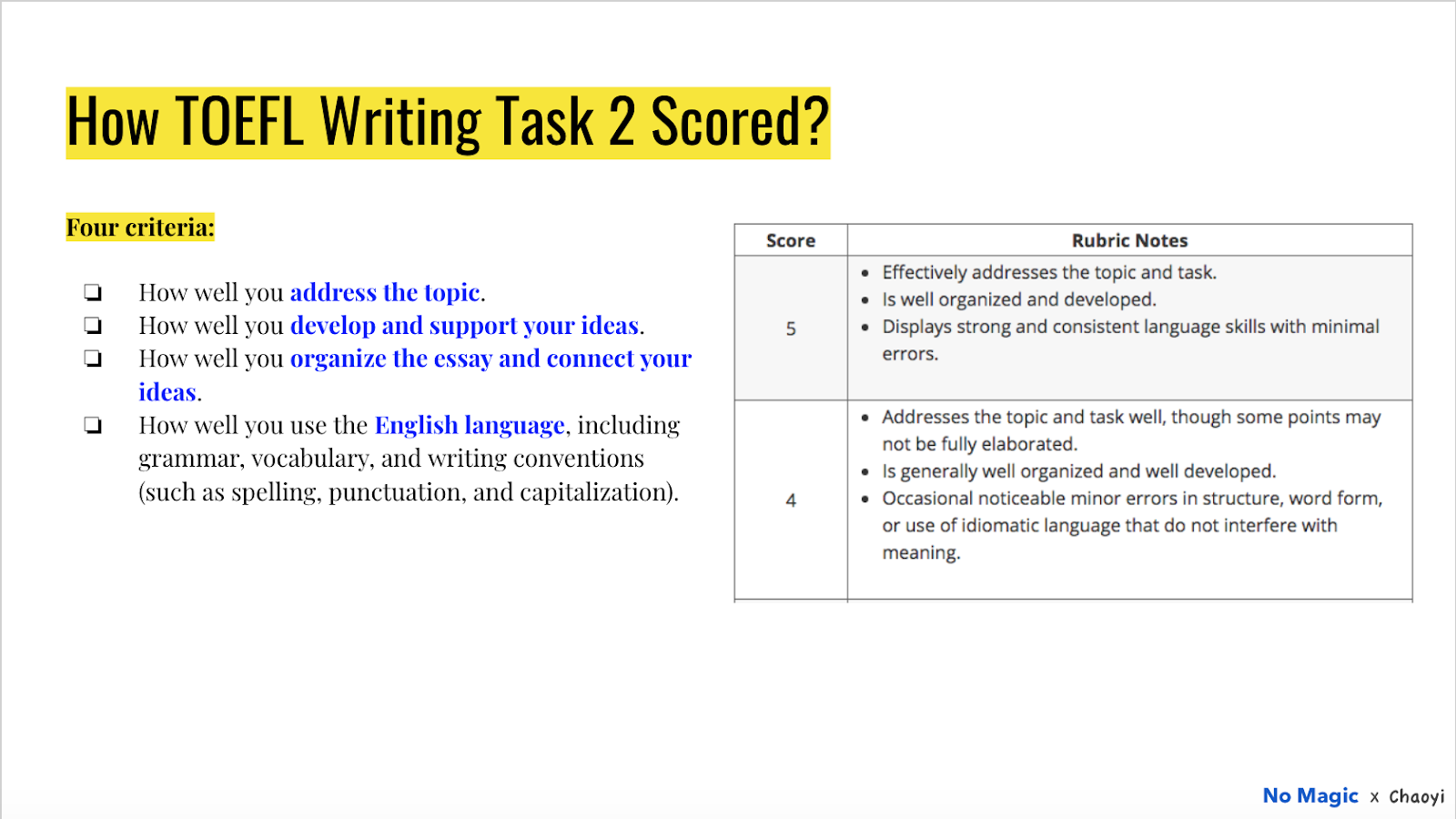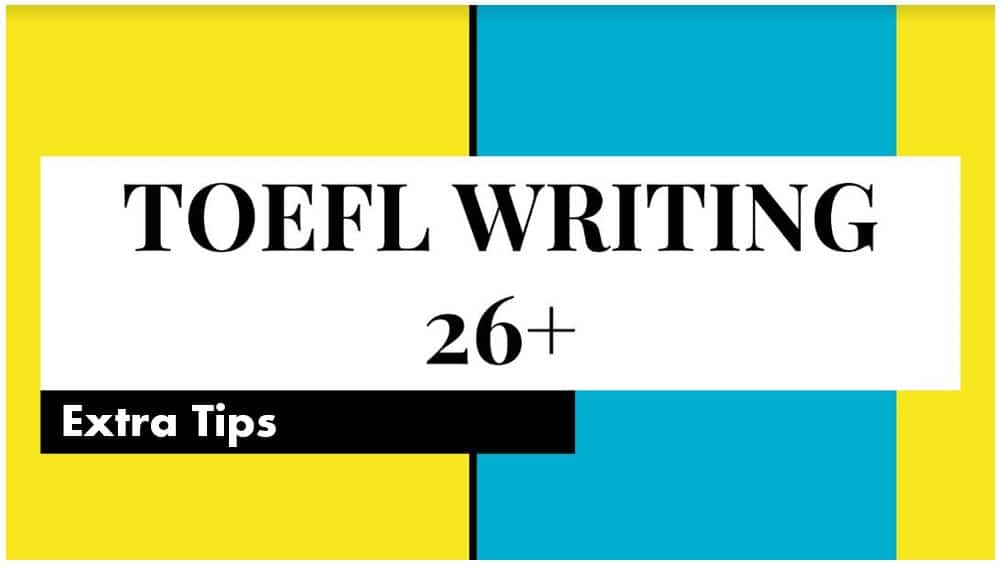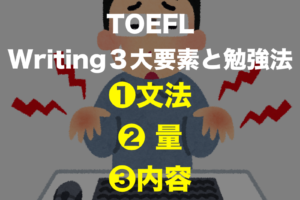




目次
採点基準の一つ「英語表現力(Strong language skills)」とは?
アジアの学生にとってはライティングもTOEFLスコアを稼ぐ重要なセクションです。ただ、多くの学生は20~25点前後でぶれていて、なかなか26、27点以上に到達できません。
問題を答える(address the topic)、文章の構成(well-organized structure)と議論の展開(well deveoped idea)に注意を払ってエッセイを書けるようになったら、最後に英語の表現を少しブラッシュアップすることで満点に手が届きます。
では、今日はTOEFLライティングの採点基準の一つ「英語表現力(Strong language skills)」についてお話しします。

言い方を変えてみる
動詞を名詞に変えてみる
文の中にある主要な動詞を名詞化することは英語によくある表現方法です。
例えば、「私はたくさん食べない(I do not eat much)」ということを「私は少食者だ(I am a light eater)」に変えることができます。
I do not eat much
–> I am a light eater
他には、例えば下記の動詞「cry」「laugh」「disappoint」を「tears」「laughter」「disappointment」に変えることによって、普通のセンテンスが若干文学作品のようになりますね。
We once cried, laughed and disappointed.
–>There were moments of tears, moments of laughter, and moments of disappointment.
主語を変えてみる
日本語や中国語の文章の中、よく人間を主語にしていますが、英語では、人間(や生き物)以外のものが主語になる場合は良くあります。この書き方は私たちが慣れていないところですね。
例えば、この一文「More and more young students studied further in the past two decades.」の主語である「若い学生たち」を変えてみましょう。
More and more young students studied further in the past two decades.
–>The past two decades witnessed a growing number of young students for further study.
「過去の20年」を主語にして、「more and more」という極日常的な表現を「a growing number of」に変えることによって、自分のstrong language skillsを採点者に見せることができます。
次の例文はどうでしょうか?
Looking out of the window, you will have a nice view.
–> A glance out of the window offers you a nice view.
二つの文が一つになって簡潔になりました。
学生の中で良くある誤解は「長い文を作れば自分の英語力を見せられる」ということです。
難しい文法を正しく使って複雑なアイディアを伝えるのはもちろん評価されますが、同じ意味を伝えるには、冗長な文より、簡潔な文がより評価されます。
受動態も使ってみる
日常生活やビジネス文書の中では、受動態より能動態のほうがましということは間違いないです。
一方で、TOEFLライティングでは、たまに受動態を使うと、逆に英語力が評価される傾向があります。受動態の使い方は皆さん良く知っていると思いますので、ここで詳しく述べません。
- Great efforts should be made to…..
- What can not be denied is that….



センテンスのバラエティを増やす
全て「I」で始まる文章は単調で退屈なので、下記のいくつかの技で文章の表現力を上げてみましょう!
”-ing & -ed”で始める
例:
- Standing by the riverside, the Master sighed,” May time go on and on like this, never ceasing day and night.”
- Reviewing what one has learned and gaining new insights, one is fit to be a teacher.
- Compared with the tradition, modernity is more dynamic.
”to do”で始める
例:
To spend too much time in study is sloth; to use them too much for ornaments is affectation; to make any judgment wholly by their rules is the humor of the scholar.
副詞の活用
Simply, amazingly, absurdly, broadly, practically 等
例:
Intelligently applied to daily life, modern technology will surely bring benefits to the well-being of the human race.
前置詞句の活用
In pursuit of, in spite of 等。普段からさまざまの英語ニュースやブログを読んでいる時、意識して集めてみましょう。
例:
In pursuit of excellence, ever pushing up the limit, life consists in the hope born of despair.
節で主語を表現
例:
- What China needs is not more morals, but more prisons for politicians.
- What can not be denied is that….
他には、「It is self-evident that…….」と「There be」 の文も使いやすいです。
倒置を活用
倒置にはいろいろな種類があります。例えば、
- 前置詞句の倒置ー「Behind him hung his photograph, taken in Mecca.」
- 形容詞句の倒置ー「Excited about the new movie to come next week are those young students.」
- 分詞句の倒置ー「Visiting the Great Wall were 200 American college students.」
- 仮定法の倒置ー「Hadn’t you (=If you had not ) studied hard, you would have failed the exam.」
TOEFLライティングでは、否定的な意味の副詞を句頭に持ってくる倒置(動詞/have/will等+主語)が使いやすいでしょう。
- Such a high standard has never been achieved before.
⇒ Never before has such a high standard been achieved.
- He had hardly arrived when she started complaining.
⇒ Hardly had he arrived when she started complaining.
- I will never do that again.
⇒ Never again will I do that.
挿入語を活用する
主語と動詞の間に挿入語を入れることも、表現力アップの技の一つです。
「there be」センテンスでは一番使いやすいです。 挿入後の前後にカンマ「,」を忘れないでくださいね。
There is, recently, a debate amongst educators that……
更に上級にするのは、挿入語の後に関係詞節を付け加えることです。
Direct experience, a necessary means to recognize the world, which differs from knowledge acquired from books, is a major step to the cognitive world.
私が良く使う技は、イントロパラグラフを書く時、TOEFLライティングのお題から、キーワードを取り出して、挿入語としてそのキーワードに対して簡単な説明を入れることです。これでバックグラウンドの一文が完成できます。
下記のいくつかの例を見てみましょう。
- Television, one of the most pervasive and persuasive technologies, marked by the rapid growth and drastic change, has a profound impact on people’s lives.
- Courage, a basic quality that every human being is supposed to possess when facing a dilemma, is highly cherished among young people.
- Convention, generally accepted practice especially with regard to social behavior, has now been increasingly challenged.
頻繁に使う単語を入れ替る「100選」表現集
頻繁に使う単語を言い換える表現集を作成しました。
日常によく使う単語(例えばimportant, opinion, best等)をより良い表現にしてみましょう。
一部完全にイコールではないものもありますので、括弧の中の内容もしっかり読んでくださいね。
1. important =crucial (extremely important),significant(amount or effect large enough to be important)
2.common=universal, ubiquitous(if something is ubiquitous, it seems to be everywhere)
3.abundant=ample(enough and usually extra), plentiful(enough for people’s needs and wants)
4.stick=adhere, cling (hold on something tightly)
5.neglect=ignore (difference: neglect means someone has not paid enough attention to something; ignore means no attention)
6.near=adjacent (two things next to each other), adjoin (the same as adjacent)
7.pursue=woo(man woos woman, old-fashioned), seek(if you seek sth, you try to obtain it. FORMAL)
8.accurate=precise(precise is exact and accurate in all details), exact(correct in every detail)
9.vague=obscure(unknown or known by only a few people)
10.top=peak, summit
11.competitor=rival, opponent(especially in sports and politics)
12.blame=condemn(if you condemn something, you say it is very bad and unacceptable)
13.opinion=perspective, standpoint(means looking at an event or situation in a particular way)
14.fame=prestige(describe those who are admired), reputation
15.build=erect(you can erect something as buildings, FORMAL), establish
16.insult=humiliate(do something or say something which makes people feel ashamed or stupid)
17.complain=grumble (complain something in a bad-tempered way)
18.primary=radical (very important and great in degree), fundamental
19.relieve=alleviate (alleviate means you make pain or sufferings less intense or severe)
20.force=coerces into(coerce means you make someone do something s/he does not want to),compel
21.enlarge=magnify(magnify means make something larger than it really is)
22.complex=intricate(if something is intricate, it often has many small parts and details)
23. lonely=solitary (if someone is solitary, there is no one near him/her)
24.small=minuscule(very small)
25.praise=extol(stronger than praise), compliment(polite and political)
26.hard-working=assiduous(someone who is assiduous works hard or does things very thoroughly)
27.difficult=arduous (if something is arduous, it is difficult and tiring, and involves a lot of efforts)
28.poor(soil)=barren, infertile(used to describe the soil is so poor that plants cannot be planted on it)
29.fragile=brittle, vulnerable(someone who is vulnerable is easily hurt emotionally or physically)
30.show=demonstrate (to demonstrate a fact means tp make it clear to people)
31.big=massive(large in size, quantity, or extent), colossal(use this word, you emphasize something’s large),tremendous
32.avoid=shun(if someone shuns something, s/he deliberately avoid that something or keep away from it)
33.fair=impartial(someone who is impartial is able to give a fair opinion or decision on something)
34.attack=assault (physically attack someone), assail (attack violently)
35.dislike=abhor(abhor means you hate something to a extreme extent for moral reasons), loathe(dislike very much)
36.ruin=devastate (it means damage something very badly, or utterly destroy it)
39.always=invariably(the same as always, but better than always)
40.forever=perpetual(a perpetual state never changes), immutable(something immutable will never change or be changed)
41.surprise=startle(it means surprise you slightly), astound(surprise you to a large degree),astonish(the same as astound)
42.enthusiasm=zeal (a great enthusiasm), fervency (sincere and enthusiasm)
43.quiet=tranquil(calm and peaceful), serene(calm and quiet)
44.expensive=exorbitant(it means too expensive that it should be)
45.luxurious=lavish(impressive and very expensive), sumptuous(grand and very expensive)
46.boring=tedious(if you describe something tedious, you mean it is boring and frustrating)
47.respect=esteem(if you esteem someone, you respect and admire him/her. FORMAL)
48.worry=fret(if you fret about something, you worry about it)
49.cold=chilly(unpleasantly cold), icy(extremely cold)
50.hot=boiling(very hot)
51.dangerous=perilous(very dangerous, hazardous(dangerous, especially to people’s safety and health)
52.nowadays=currently
53.only=unique(the only one of its kind), distinctive;
54.stop=cease(if something ceases, it stops happening or existing)
55.part=component(the components of something are the parts that it is made of)
56.result=consequence(the results or effects of something)
57.obvious=apparent, manifest
58.based on=derived from
60.quite=fairly
61.pathetic=lamentable(very uncomfortable and disappointing)
62.field=domain(a particular field of thought, activities or interest)
63.appear=emerge(come into existence)
64.whole=entire(the whole of something)
65.wet=moist(slightly wet), damp(slightly wet), humid(very damp and hot)
66.wrong=erroneous(incorrect or partly correct)
67.difficult=formidable
68.change=convert(change into another form)
69.typical=quintessential(this word means represent a typical example of something)
70.careful=cautious(very careful in order to avoid danger), prudent(careful and sensible)
71.ability=capacity, capability(the same as ability)
72.strange=eccentric(if some one is eccentric, s/he behaves in a strange way, or his/her opinion is different from most people)
73.rich=affluent(if you are affluent, you have a lot of money)
74.use= utilize (the same as use)
75.dubious=skeptical(if you are skeptical about something, you have doubts on it。)
76.satisfy=gratify (if you are gratified by something, it gives you pleasure and satisfaction)
77.short=fleeting, ephemeral(if something is ephemeral, it lasts a short time)
78.scholarship=fellowship
79.angry=enraged(extremely angry)
80.smelly=malodorous(used to describe an unpleasant smell)
81.ugly=hideous(if something is hideous, it is very ugly or unattractive)
82.attractive=appealing(pleasing and attractive), absorbing(something absorbing can attract you a great deal)
83.diverse=miscellaneous(a miscellaneous groups consists of many different kinds of things)
84.disorder=disarray, chaos
85.crazily=frantically(used to describe someone who behaves in a wild and uncontrolled way)
86.rapid=meteoric(ATTENTION: meteoric is only used to describe someone achieves success quickly)
87.ordinary=mundane(very ordinary and not at interesting or unusual)
88.despite=notwithstanding(FORMAL)
89.best=optimal(used to describe the best level something can achieve)
90.sharp=acute(severe and intense)
91.unbelievable=inconceivable(if you deem something inconceivable, you think it very unlike to happen )
92.puzzle=perplex(something perplex someone means it confuses and worries him/her because he/she does not understand it)
93.method=avenue(away of getting something done)
94.famous=distinguished(used to describe people who are successful in their career)
95.ancient=archaic(extremely old and extremely old-fashioned)
96.decorate=embellish(embellish means make something look more attractive via decorating it with something else)
97.possible=feasible(if something is feasible, it can be done, made or achieved)
98.so=consequently, accordingly
99.rare=infrequent (doesn’t happen often)
100.greedy=rapacious(greedy and selfish)
まとめ




TOEFL Writing 関連記事
- TOEFLライティング出題傾向の分析と対策
- 例題から見る三択一問題の構成と書き方
- ロジック的に論点を支える書き方【Independent Task】
- TOEFLライティング無料添削企画 Independentエッセイ
- 高得点取得に必須!TOEFLライティング採点基準の分析と対策


















